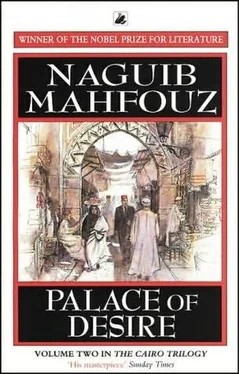Naguib Mahfouz - Palace of Desire
Здесь есть возможность читать онлайн «Naguib Mahfouz - Palace of Desire» весь текст электронной книги совершенно бесплатно (целиком полную версию без сокращений). В некоторых случаях можно слушать аудио, скачать через торрент в формате fb2 и присутствует краткое содержание. Жанр: Современная проза, на английском языке. Описание произведения, (предисловие) а так же отзывы посетителей доступны на портале библиотеки ЛибКат.
- Название:Palace of Desire
- Автор:
- Жанр:
- Год:неизвестен
- ISBN:нет данных
- Рейтинг книги:5 / 5. Голосов: 1
-
Избранное:Добавить в избранное
- Отзывы:
-
Ваша оценка:
- 100
- 1
- 2
- 3
- 4
- 5
Palace of Desire: краткое содержание, описание и аннотация
Предлагаем к чтению аннотацию, описание, краткое содержание или предисловие (зависит от того, что написал сам автор книги «Palace of Desire»). Если вы не нашли необходимую информацию о книге — напишите в комментариях, мы постараемся отыскать её.
, his rebellious children struggle to move beyond his domination, as the world around them opens to the currents of modernity and political and domestic turmoil brought by the 1920s.
Palace of Desire — читать онлайн бесплатно полную книгу (весь текст) целиком
Ниже представлен текст книги, разбитый по страницам. Система сохранения места последней прочитанной страницы, позволяет с удобством читать онлайн бесплатно книгу «Palace of Desire», без необходимости каждый раз заново искать на чём Вы остановились. Поставьте закладку, и сможете в любой момент перейти на страницу, на которой закончили чтение.
Интервал:
Закладка:
He was enraged. It was very hard to obtain nothing but this haughty cold-shoulder treatment in return for his enormous love. He was painfully aware that the only expression his anger could find was love and loyalty and that the one way to counteract the blow was prayerful supplication. If his soul had stood accused by anyone else, even by Husayn Shaddad, Kamal would not have hesitated to sever ties, but since the plaintiff was the beloved, all the slivers of anger sped back to his chest. His hostility was poured out on a single target, Kamal. A desire for revenge drove him to inflict punishment on the defendant, Kamal. He sentenced himself to a life of renunciation. A pervasive, sad, obstinate feeling directed him to avoid her forever. He had enjoyed her friendship. Indeed he had considered it a blessing beyond his wildest dreams, even though the force of his love overwhelmed heavens and earth. More than all that, he had enjoyed his despair at ever being loved by her and had forced his unruly cravings to be satisfied with a sweet smile or a kind word, even if these came in parting. But to be ignored by her saddened, baffled, and disoriented him, leaving him alienated from the entire world. In this manner he was afforded an opportunity to feel what a dead man might if still conscious.
His thoughts churned away mercilessly during his waking hours that whole week he was separated from the Shaddad mansion. He kept brooding about his failure, which he agonized over repeatedly — in the morning at home having breakfast with his father, walking along the street with senses that only appeared to be function] ng, at the Teachers College listening absentmindedly to a lecture, reading in the evening with scant attention, or humbly begging entry to sleep's ideal realm. Early in the morning when he opened his eyes, these thoughts were ready to fight for control of him, as tliough they had been lying in ambush at the threshold of consciousness or had awakened him out of an insatiable urge to devour him. Yes, how hideous the soul is when it turns on its master.
On Friday he went to the palace of love and torment, arriving slightly ahead of the appointed hour. Why had he been looking forward so impatiently to this day? What did he hope to gain from it? Did he wish to find some indication, even if only a feeble pulse, that would let him think life had not yet departed from hope's body? Did he dream of a miracle that would unexpectedly cause his beloved to be friendly again for no conceivable reason, exactly as she had grown angry? Or was he trying to stoke the fires of hell so that he might taste cold as hes all the sooner?
He proceeded to the garden along the path strewn with memories. Then he saw Aida seated on a chair, holding Budur on the edge of the table in front of her. There was no one else in the gazebo. He stopped walking and thought of going back outside before she noticed him. But he rejected this idea defiantly and scornfully. He advanced on the gazebo, driven by a strong desire to face his punishment and to strip the veil from the puzzle that had slain his security and peace of mind. This lovely, gracious creature, this ethereal spirit disguised as a woman did she realize what her harshness had done to him? Would her conscience rest comfortably once he complained about his suffering? Her tyrannical hold over him resembled the sun's over the earth, which was destined to orbit in a prescribed path. If it drew too close to the sun they would fuse together, but if the earth retreated too far, it would be annihilated once and for all.
She could bestow one smile on him, and he would salve all his pains with it. He approached her, deliberately treading heavily so she would hear. She turned her head around inquisitively, but then her face seemed to go blank. He stopped a little more than a meter from where she was sitting, bowed his head humbly, and with a smile said, "Good morning."
She nodded her head slightly but did not speak. Then she looked straight in front of her.
There was no longer any doubt that hope was a rigid corpse. He imagined she would shout, "Take your head and nose away so they don't obscure the light of the sun". Budur waved to him. He glanced down at her beautiful and radiant face and went toward her to mask his defeat with her innocent affection. She grabbed hold of his arms, and he learned over to kiss her cheek warmly and gratefully.
Then the voice that in the past had opened the portals of celestial music for him said roughly, "Please don't kissher. A kiss is not a hygienic greeting."
A disconcerted laugh escaped from him, he knew not how or why. He became quite pale. At first dumbfounded and in a stupor, he finally responded incredulously, "It's not the first kiss, so far as I remember."
She shrugged her shoulders as if to say, "That changes nothing."
"Oh!" Was he to begin a new week of torture without getting to utter a word in self-defense?
"Allow me to ask what secret is behind this bizarre change? I've been wondering all week long and have been unable to find an answer."
She did not seem to have heard him and consequently did not bother to reply.
With his voice betraying his anxiety and pain, he continued: "What really makes me sad is that I'm innocent. I've done nothing to deserve this punishment."
She still seemed determined to remain silent, but he was afraid Husayn would arrive before she was coaxed into speaking. In a voice combining complaint with entreaty he quickly said, 'Doesn t an old friend like me deserve at least to be informed of his offense?"
She raised her head, cast him a sideways look as gloomy as storm clouds, and said angrily, "Don't pretend you're innocent!"
"O Lord of the heavens, can sins be committed unconsciously?" he asked himself as he mechanically patted Budur's hands, with which she was attempting to draw him close to her, for she understood nothing of what was going on.
"Alas., my suspicions are correct," he said jerkily. "This is what my heart told me, but I couldn't believe it. You think I've done something wrong. Isn't that so? But of what offense are you accusing, me? By your life, tell me. Don't wait for me to confess, for the simple reason that I've committed no crime against you. No matter how much I search the recesses of my soul, life, and past I can find no intention, word, or deed meant to harm you. I'm amazed chat you don't realize how self-evident this is."
She replied scornfully, "I'm not the kind of girl who's taken in by theatrics. Ask yourself what you said about me."
With alarm he asked, "What have I said about you? To whom did I say it? I swear to you …"
She cut him off in exasperation: "I'm not the least bit interested in your oaths. Save them for yourself. The oaths of slanderers are not to be trusted. The important thing is for you to remember what you said about me."
He tossed his overcoat on a chair as though preparing to throw himself i nto the debate and stepped away from Budur to free himself from her innocent attempts to monopolize his attention. Then he said so heatedly that his words had the ring of truth, "I've never said anything about you I would be embarrassed to repeat now in your hearing. I have never said anything bad about you in my whole life. I wouldn't be able to, if you only realized…. If one of our friends has told you something about me that's angered you, then he's a despicable liar who doesn't deserve your trust. I'm ready to confront him in your presence so that you can see for yourself whether he's telling the truth or, more precisely, lying. You have no defects, so how couJd I mention any? You've really been unfair to me."
She commented sarcastically, "Thanks for this praise, which I don't deserve. I don't think I'm that flawless… if for no other reason than that I haven't received a totally Egyptian upbringing."
Читать дальшеИнтервал:
Закладка:
Похожие книги на «Palace of Desire»
Представляем Вашему вниманию похожие книги на «Palace of Desire» списком для выбора. Мы отобрали схожую по названию и смыслу литературу в надежде предоставить читателям больше вариантов отыскать новые, интересные, ещё непрочитанные произведения.
Обсуждение, отзывы о книге «Palace of Desire» и просто собственные мнения читателей. Оставьте ваши комментарии, напишите, что Вы думаете о произведении, его смысле или главных героях. Укажите что конкретно понравилось, а что нет, и почему Вы так считаете.












